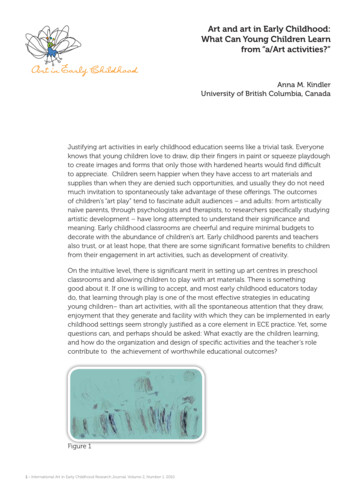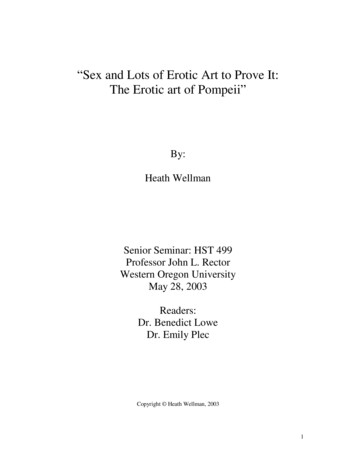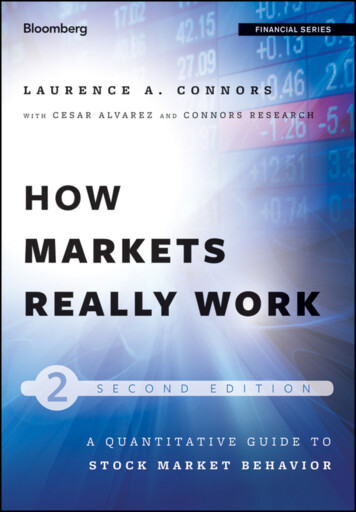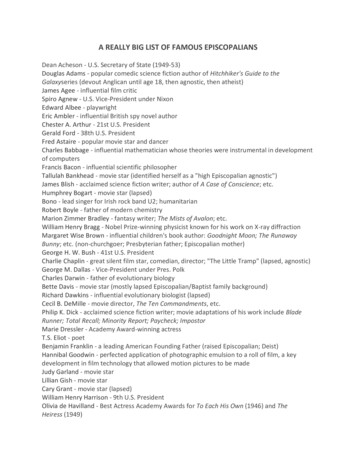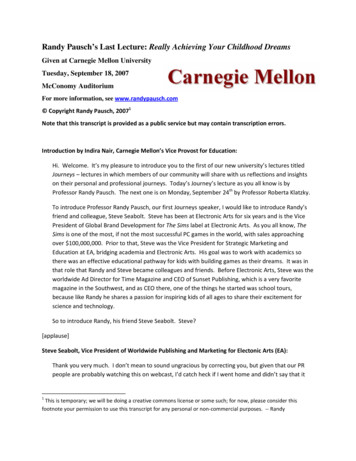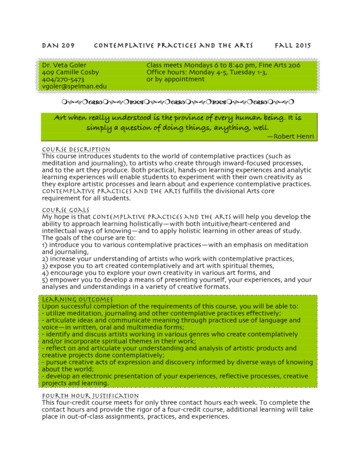
Transcription
DAN 209Contemplative Practices and the ArtsDr. Veta Goler409 Camille Cosby404/270-5473vgoler@spelman.eduFall 2015Class meets Mondays 6 to 8:40 pm, Fine Arts 206Office hours: Monday 4-5, Tuesday 1-3,or by appointmentm h g d c m h g b a m h g d c m h g b a m h g d c m h g Art when really understood is the province of every human being. It issimply a question of doing things, anything, well.—Robert HenriCourse DescriptionThis course introduces students to the world of contemplative practices (such asmeditation and journaling), to artists who create through inward-focused processes,and to the art they produce. Both practical, hands-on learning experiences and analyticlearning experiences will enable students to experiment with their own creativity asthey explore artistic processes and learn about and experience contemplative practices.Contemplative Practices and the Arts fulfills the divisional Arts corerequirement for all students.Course GoalsMy hope is that Contemplative Practices and the Arts will help you develop theability to approach learning holistically—with both intuitive/heart-centered andintellectual ways of knowing—and to apply holistic learning in other areas of study.The goals of the course are to:1) introduce you to various contemplative practices—with an emphasis on meditationand journaling,2) increase your understanding of artists who work with contemplative practices,3) expose you to art created contemplatively and art with spiritual themes,4) encourage you to explore your own creativity in various art forms, and5) empower you to develop a means of presenting yourself, your experiences, and youranalyses and understandings in a variety of creative formats.Learning OutcomesUpon successful completion of the requirements of this course, you will be able to:- utilize meditation, journaling and other contemplative practices effectively;- articulate ideas and communicate meaning through practiced use of language andvoice—in written, oral and multimedia forms;- identify and discuss artists working in various genres who create contemplativelyand/or incorporate spiritual themes in their work;- reflect on and articulate your understanding and analysis of artistic products andcreative projects done contemplatively;- pursue creative acts of expression and discovery informed by diverse ways of knowingabout the world;- develop an electronic presentation of your experiences, reflective processes, creativeprojects and learning.Fourth Hour JustificationThis four-credit course meets for only three contact hours each week. To complete thecontact hours and provide the rigor of a four-credit course, additional learning will takeplace in out-of-class assignments, practices, and experiences.
Course RequirementsTeachers and students (leadership and people), co-intent on reality, are both Subjects, notonly in the task of unveiling that reality, and thereby coming to know it critically, butin the task of re-creating that knowledge. As they attain this knowledge of realitythrough common reflection and action, they discover themselves as its permanent recreators.—Paulo FreireI include this quote because I view the learning process as an interactive endeavor inwhich you and I both have responsibilities. My role is to prepare assignments andfacilitate class activities that I believe will be effective in the learning process, toevaluate your work in a timely manner, and to create a safe space in which everyonecan be who she (or he) is and freely contribute to the class. Your role in the learningprocess is to complete assignments on time, attend class sessions and out-of-classevents, and share your thoughts, knowledge and questions—substantively—indiscussions and activities.m h g d c m h g b a m h g d c m h g b a m h g d c m h g This is not a time to live without a practice. It is a time when all of us will need the most faithful, selfgenerated enthusiasm (enthusiasm: to be filed with god) in order to survive in human fashion. Whetherwe reach this inner state of recognized divinity through prayer, meditation, dancing, swimming, walking,feeding the hungry or enriching the impoverished is immaterial. We will be doubly bereft without someform of practice that connects us, in a caring way, to what begins to feel like a dissolving world.—Alice Walkerm h g d c m h g b a m h g d c m h g b a m h g d c m h g The requirements for this course include:1. Meditation and Journaling Practices: regular practices of meditation and MorningPages (described in The Artist's Way) along with a Journal and a Meditation Log.You will be meditating and engaging in other contemplative practices within andoutside of class, and reflecting on and tracking your practices. In your private Journal(for your eyes only), you will write Morning Pages at least three times each week. Youshould also bring your Journal to class, as you will be expected to write down yourexperiences of meditating and doing other contemplative practices in class.In addition, you will meditate for at least 15 minutes at least three days a week and willtrack your meditations, noting dates and lengths—along with any experiences you careto share with me—in an online Meditation Log, which I will read. I will review yourMeditation Log twice during the semester. I encourage you to write down privatethoughts about your meditation experiences in your Journal, which only you will see.I also encourage you to write in your Journal your reactions to various course activitiesand experiences, your responses to performances, the gallery visit, the Hahn Woodsvisit, and Moodle reflections, as well as any other related thoughts you have. Keepingnotes about these will help you with your various reflection papers and with yourDigital Narrative project.2
2. Moodle Reflections: postings of your responses to prompts based on The Artist'sWay and other readings and experiences, as well as occasional responses to classmates’postings. You will post a substantive entry (of at least 300 words) by 11 pm eachThursday and Sunday.3. Arts Viewing Experiences: attendance at three on-campus performances—the Dramaand Dance productions of Seven Guitars and Flow, and Spelman Dance Theatre’s fallconcert—and a visit to the current exhibit of the Spelman Museum of Fine Art,Howardena Pindell. You will submit extended Reflections postings for each on Moodle.You are also encouraged to attend An Evening with Howardena Pindell and Dr. MarySchmidt Campbell and write a reflection post for extra credit.4. Contemplative Arts and Research Explorations: participation in all in-classcontemplative arts experiences, two out-of-class "Artist Dates" and a Digital Sabbathexperience—with extended Reflections on these—and research for creative projects.5. An Observation Paper (1000 words), in which you write about your experiences ofthe hour-long observation exercise and the museum exhibit, and any insights thatarose.6. Two Reflection Papers (1000 words each), one on your meditation and MorningPages practices and one on your experiences of contemplative computing.7. A Creativity Project, in which you use contemplative practice to create a work of art(in any genre). You will work on the piece over the semester and will perform orpresent it during the final exam period, on Monday, December 7, 6 to 8 pm. If needed,you should be able to photograph or record the completed work for presentation to theclass, and if you like, inclusion in your Digital Narrative. I encourage you to documentyour process of creation in your Journal as you will also write a two-page reflectionpaper discussing your approach, practices, goals, and experience of creating.8. A Digital Narrative: such as a webpage, Facebook page, or blog (on the bloggingwebsite of your choice—Blogger, Wordpress, Wix, etc.) or a video and screen captureproject (with Camtasia or other software), that tracks your experience andunderstanding of "the contemplative" over the course of the semester. You willcomplete the project in several steps, a paragraph of your idea, a draft, and the finalproject, which you will present in class on Monday, November 30.m h g d c m h g b a m h g d c m h g b a m h g d c m h g Required Texts & a Note about ReadingsCameron, Julia. The Artist’s Way: A Spiritual Path to Higher Creativity. NY: Jeremy P.Tarcher/Putnam, 2002.Pang, Alex Soojung-Kim. The Distraction Addiction: Getting the Information You Needand the Communication You Want, Without Enraging Your Family, AnnoyingYour Colleagues, and Destroying Your Soul. NY: Little, Brown and Company,2013.Williams, Mark and Danny Penman. Mindfulness: An Eight-Week Plan for FindingPeace in a Frantic World. NY: Rodale, Inc., 2012.I will post additional required readings about contemplative practice—in general andspecifically related to various topics—on Moodle for you to read. These readings aretaken from some of the texts listed in the "Other Resources of Interest" section.m h g d c m h g b a m h g d c m h g b a m h g d c m h g 3
m h g d c m h g b a m h g d c m h g b a m h g d c m h g Artist for a SemesterAlthough we will be learning about professional artists and their work this semester, Ibelieve that you will get the most from this course by approaching it as if you are anartist for a semester. Some of you are artists—you’re musicians or poets or sculptors ordancers—and may be majoring in an art form. Others of you may not consideryourselves to be artists and may be majoring in a “non-art” discipline. I love the RobertHenri quote at the beginning of the syllabus because it means that all of us can beartists if we bring our passion and skill to our efforts. So, I invite you to think of yourmajor discipline—or whatever focus of study or activity you choose—as your art. Seehow you can apply some of the concepts and contemplative practices to deepen yourexperience of your chosen art form.m h g d c m h g b a m h g d c m h g b a m h g d c m h g This is an absolute necessity for anybody today. You must have a room, or a certain hour or so a day,where you don't know what was in the newspapers that morning, you don't know who your friends are,you don’t know what you owe anybody, you don't know what anybody owes you. This is a place whereyou can simply experience and bring forth what you are and what you might be. This is the place ofcreative incubation. At first you may find that nothing happens there. But if you have a sacred placeand use it, something eventually will happen.—Joseph Campbellm h g d c m h g b a m h g d c m h g b a m h g d c m h g Course PoliciesEvaluationClass and Moodle ParticipationMeditation and Journaling Practices(with Journal/Meditation Log)McIntyre IBL AssignmentProctor/Evans IBL AssignmentObservation PaperConscious Computing Reflection PaperMeditation Reflection PaperCreativity Project (withDocumentation Paper)Digital Narrative20%15551012.512.51010100Grading ScaleA95 and aboveA90-94B 87-89B83-86B80-82C 77-79C73-76C70-72D 67-69D63-66F62 and belowAttendance and ParticipationClassroom participation is an important element of this course and absence preventsparticipation. Missing classes is especially problematic for a course that meets onlyonce a week. Therefore, you are allowed only one absence without penalty. Also,habitual tardiness will not be tolerated. Two tardies equal one absence. Arriving in classmore than 15 minutes late will constitute an absence.4
A Note about LatenessI have structured class sessions so that we learn contemplatively as we learn aboutcontemplative practices and the arts. Because all aspects of the class contribute todeepening awareness and knowledge, it is important that you arrive in time toparticipate in everything we do. If you happen to arrive for class during meditation,please wait quietly outside the door until it is opened. I encourage you to use this timeto bring yourself fully present for class by doing some simple stretches or deepbreathing exercises.All written assignments are to be submitted on the class Moodle site—papers, viaTurnitin links. Grades for late assignments will be lowered one letter for each day late.Assignments received more than 72 hours after they are due will receive grades of zer0.m h g d c m h g b a m h g d c m h g b a m h g d c m h g I was never drawn to participate in sacred dance classes. I feared myirreverence, cynicism, and snobbery. Little did I realize that my problemwas linguistic. Sacred dancing is redundant.—Deborah Haynesm h g d c m h g b a m h g d c m h g b a m h g d c m h g Cell Phones and Other Electronic DevicesAs you might imagine, a class focusing on contemplative practices can seem at oddswith the technology that is such an important part of our lives. Our technologicaldevices encourage us to spread our attention and contemplative practices help us tofocus. You will see that Pang's book is designed to help us use electronic devicescontemplatively. Your attention and presence are important and expected during thisclass. So I am asking that you set aside some typical ways of being during our classsessions.First, please turn your cell phone off—not to “vibrate,” which is still audible—and placeit out of sight before you come to class. A ringing or vibrating cell phone will equal atardy. We will have a pause in the middle of the class, where you may check in withothers, if needed.Next, please let me know if you are reading your books electronically. If so, you mayuse your laptop, iPad or cell phone in class. But, if it appears that you are texting,checking email or Facebook, or are focusing somewhere other than this class, you willlose the privilege of using technological devices in class for the rest of the semester.Finally, studies show that students who take notes on their laptops do less well thanthose who taken notes by hand. I'm just sayin' .Academic Integrity (from Spelman College Bulletin)At the heart of Spelman Colleg
Williams, Mark and Danny Penman. Mindfulness: An Eight-Week Plan for Finding Peace in a Frantic World. NY: Rodale, Inc., 2012. I will post additional required readings about contemplative practice—in general and specifically related to various topics—on Moodle for you to read. These readings are
